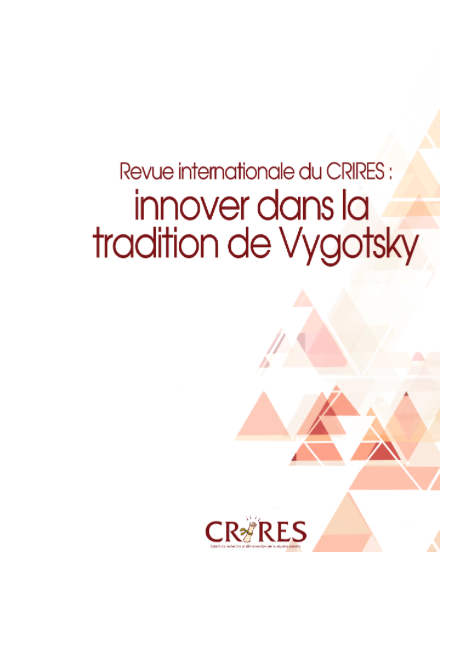La volition et l’agentivité transformatrice : perspective théorique de l’activité
DOI:
https://doi.org/10.51657/ric.v1i1.41017Keywords:
Agency, . Volition, Change, Laboratory, Library, Double stimulationAbstract
This article examines the formation of transformative agency in organizations, using Vygotsky’s theorizing of will and willful action and the dialectical principle of ascending from the abstract to the concrete as points of departure. Vygotsky’s principle of double stimulation offers a framework within which limitations of conceptualizations of agency may be overcome. To illustrate and further examine a different approach to agency, the article discusses a Change Laboratory intervention conducted in a university library. The analysis depicts transformative agency as willful collective engagement in overcoming critical conflicts with the help of mediating cultural artifacts characterized as second stimuli by Vygotsky. In the case analyzed here, the second stimulus was elaborated on and implemented as a theoretical abstraction with expansive generalizing potential for multiple concrete applications. The analysis indicates that, for serving as a second stimulus and initial abstraction, artifacts have to be appropriated by the participants as instrumentality for working out their conflicts and investing in agentive initiatives to transform their activities.
References
Battilana, J. et D’Aunno, T. (2009). Institutional work and the paradox of embedded agency. Dans T. B. Lawrence, R. Suddaby et B. Leca (Dir.), Institutional work : Actors and agency in institutional studies of organizations (pp. 31-58). Cambridge : Cambridge University Press.
Bruch, H. et Ghoshal, S. (2004). A bias for action : How effective managers harness their willpower, achieve results, and stop wasting time. Boston : Harvard Business School Press.
Davydov, V. V. (1990). Types of generalization in instruction : Logical and psychological problems in the structuring of school curricula. Reston : National Council of Teachers of Mathematics.
Engeström, Y. (2007). Putting Vygotsky to work: The Change Laboratory as an application of double stimulation. Dans H. Daniels, M. Cole et J. V. Wertsch (Dir.), The Cambridge companion to Vygotsky. Cambridge : Cambridge University Press.
Engeström, Y. (2008). From teams to knots : Activity-theoretical studies of collaboration and learning at work. Cambridge : Cambridge University Press.
Engeström, Y. (2011). From design experiments to formative interventions. Theory and Psychology, 21(5), 598-628.
Engeström, Y., Engeström, R. et Vähäaho, T. (1999). When the center does not hold : The importance of knotworking. Dans S. Chaiklin, M. Hedegaard et U. J. Jensen (Dir.), Activity theory and social practice : Cultural-historical approaches. Aarhus : Aarhus University Press.
Engeström, Y., Nummijoki, J. et Sannino, A. (2012). Embodied germ cell at work: Building an expansive concept of physical mobility in home care. Mind, Culture, and Activity, 19(3), 287-309.
Engeström, Y., Rantavuori, J., et Kerosuo, H. (sous presse). Expansive learning in a library : Actions, cycles and deviations from instructional intentions. Vocations and Learning, 6(1), 81-106.
Engeström, Y., Virkkunen, J., Helle, M., Pihlaja, J. et Poikela, R. (1996). Change laboratory as a tool for transforming work. Lifelong Learning in Europe, 1(2), 10-17.
Engeström, Y. et Sannino, A. (2010). Studies of expansive learning : Foundations, findings and future challenges. Educational Research Review, 5, 1-24.
Gollwitzer, P. M. et Sheeran, P. (2006). Implementation intentions and goal achievement : A meta-analysis of effects and processes. Advances in Experimental Social Psychology, 38, 69-119.
Greenstein, D. (2010). Strategies for sustaining the university library. Portal : Libraries and the Academy, 10(2), 121-125
Haapasaari, A., Engeström, Y. et Kerosuo, H. (2013). The emergence of learners' transformative agency in a Change Laboratory intervention. Manuscript soumis pour publication.
Heckhausen, H. et Gollwitzer, P. M. (1987). Thought contents and cognitive functioning in motivational versus volitional states of mind. Motivation and Emotion, 11(2), 101-120.
Il’enkov, E. V. (1982). The dialectics of the abstract and the concrete in Marx's Capital. Moscou : Progress Publishers.
Laitinen, A. (2012). Double stimulation and agency in the experiment of the “meaningless situation” (Thèse de licence). Helsinki, Université de Helsinki.
Lawrence, T. B. et Suddaby, R. (2006). Institutions and institutional work. Dans S. R. Clegg, C. Hardy, T. B. Lawrence et W. R. Nord (Dir.), Handbook of organization studies (pp. 215-254). London : Sage.
Marx K. (1976). Theses on Feuerbach. Dans K. Marx et F. Engels, Collected works. Vol.5. London : Lawrence et Wishart.
Sannino, A. (2008). From talk to action : Experiencing interlocution in developmental interventions. Mind, Culture, and Activity, 15(3), 234-257.
Sannino, A. (2011). Activity theory as an activist and interventionist theory. Theory & Psychology, 21(5), 571-597.
Seo, M. G. et Creed, W. E. D. (2002). Institutional contradictions, praxis, and institutional change : A dialectical perspective. Academy of Management Review, 27(2), 222-247.
Van der Veer, R. et Valsiner, J. (1991). Understanding Vygotsky : A quest for synthesis. Oxford, UK : Basil Blackwell.
Virkkunen, J. (2006a). Dilemmes dans la construction d'une capacité d'action partagée de transformation. Activités revue électronique, 3(1), 19-42.
Virkkunen, J. (2006b). Dilemmas in building shared transformative agency. Activités revue électronique, 3(1), 43-66.
Virkkunen J. et Newnham, D. (2013). The Change Laboratory : A tool for collaborative development of work activities. Manuscript soumis pour publication.
Vygotsky, L. S. (1987). Lectures on psychology. Dans The collected works of L. S. Vygotsky. Vol. 1. Problems of general psychology. New York : Plenum.
Vygotsky, L. S. (1997). The instrumental method in psychology. Dans The collected works of L. S. Vygotsky. Vol. 3. Problems of the theory and history of psychology. New York : Plenum.
Vygotsky, L. S. (1999). Tool and sign in the development of the child. Dans The collected works of L. S. Vygotsky. Vol. 6 : Scientific legacy. New York : Plenum.
Downloads
Published
Issue
Section
License
Copyright (c) 2017 Yrjö Engeström, Annalisa Sannino

This work is licensed under a Creative Commons Attribution-NonCommercial-NoDerivatives 4.0 International License.

